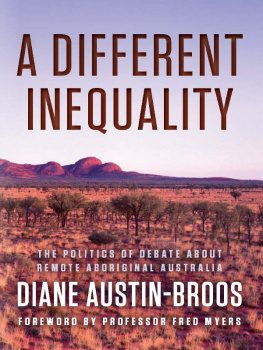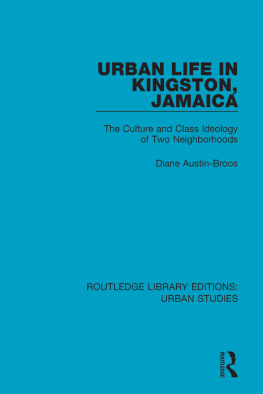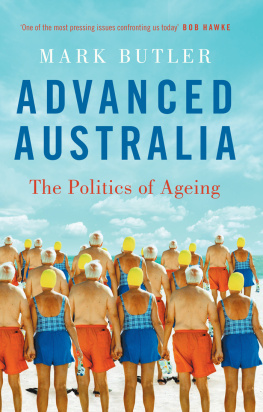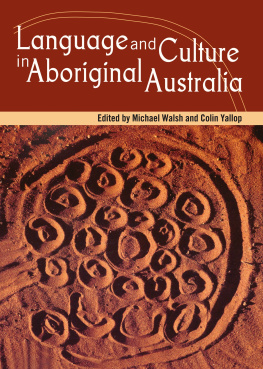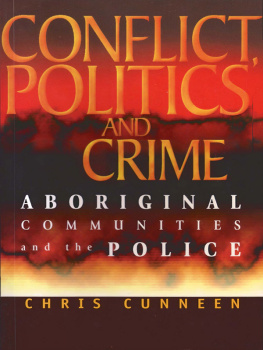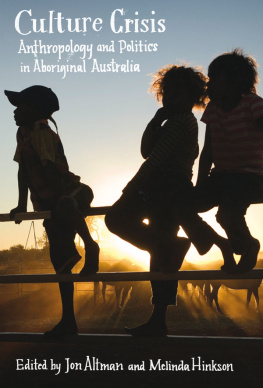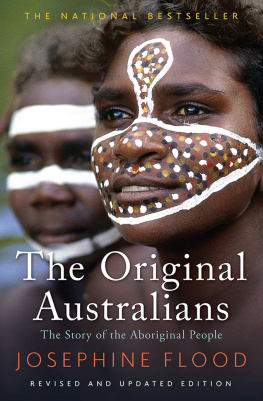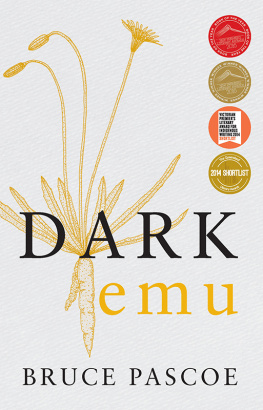Does readers the important service of placing the debates about Indigenous policyand Indigenous futures in remote Australiainto a theoretically coherent framework.
From the foreword by Professor Fred Myers, New York University
In an original and highly provocative critique, Diane Austin-Broos asks whether anthropologists commitment to cultural difference, and failure to treat the residents of remote Aboriginal communities as historical subjects, blinded them to inequality created by the legal system and the state. This lucid and accessible genealogy of the divergent streams of recent anthropological thinking and debate is a must read for anybody with a serious interest in understanding the current conf licted views about remote Aboriginal futures.
Nicolas Peterson, Professor of Anthropology, Australian National University
Once more there is an Aboriginal crisis, this time in Alice Springs as more members of remote communities move to overcrowded town camps. Where do we turn to understand better why this is happening and what should be done? Austin-Broos discusses why these questions have not been answered well by anthropologists, economists and opinion writers. She analyses the unsettled debate and polarization about policies for remote communities. This book is an important contribution. Ideas generate policy and we all have an interest in the way in which ideas are developed in our universities and think tanks. In this insightful and different book Austin-Broos challenges us all.
Bob Gregory, Professor of Economics, Australian National University
Other titles by Diane Austin-Broos
Arrernte Present, Arrernte Past: Invasion, violence and imagination in
Indigenous Central Australia
Jamaica Genesis
Urban Life in Kingston, Jamaica
Australian Sociologies
A DIFFERENT INEQUALITY
THE POLITICS OF DEBATE ABOUT
REMOTE ABORIGINAL AUSTRALIA
DIANE AUSTIN-BROOS

First published in 2011
Copyright Diane Austin-Broos 2011
All rights reserved. No part of this book may be reproduced or transmitted in any form or by any means, electronic or mechanical, including photocopying, recording or by any information storage and retrieval system, without prior permission in writing from the publisher. The Australian Copyright Act 1968 (the Act) allows a maximum of one chapter or 10 per cent of this book, whichever is the greater, to be photocopied by any educational institution for its educational purposes provided that the educational institution (or body that administers it) has given a remuneration notice to Copyright Agency Limited (CAL) under the Act.
Allen & Unwin
83 Alexander Street
Crows Nest NSW 2065
Australia
Phone: (61 2) 8425 0100
Fax: (61 2) 9906 2218
Email: info@allenandunwin.com
Web: www.allenandunwin.com
Cataloguing-in-Publication details are available
from the National Library of Australia
www.trove.nla.gov.au
ISBN 978 1 74237 049 1
Index by Frances Paterson/Olive Grove Indexing Services
Set in 11/13.5 pt Bembo by Bookhouse, Sydney
Printed in Singapore by KHL Printing Co Pte Ltd
10 9 8 7 6 5 4 3 2 1
The Indigenous Australian population has altered fundamentally from one typical of the former hunter-gatherer way of life to one that is very poor, marginalised, powerless and sedentarised.
Marcia Langton, The Shock of the New: A postcolonial dilemma
for Australianist anthropology
Poverty is not a certain small amount of goods, nor is it just a relation between means and ends; above all it is a relation between people. Poverty is a social status. As such it is the invention of civilization. It has grown with civilization [and] invidious distinction.
Marshall Sahlins, Stone Age Economics
Contents
It should be no secret to any reader that there is a crisis in Australias remote Indigenous communities, a crisis of social suffering and failed expectations, and there is a crisis in thinking about these communities and their futures. When Diane Austin-Broos asked me to write a foreword for this book, I was hesitantas an American living in the USto step into the breach of the swirling controversies, unsure of my own position. I wish it were otherwise. In 1973, when I began my research in remote Australia, the great work of W.E.H. Stanner (1968) and C.D. Rowley (1972) seemed to promise a path to an exciting future for Indigenous communities.
The suffering in remote Australia is now, again, a national scandal. It is not new. What is newer is the fading of possibilities, the decline of expectations for the not-yet. This flows from an exhaustion ofparadigms of hope. When I began professional life as an anthropologist, in the early 1970s, the paradigm of assimilation as a solution for what was called then the Aboriginal problem had faded. Charles Rowleys famous study, The Destruction of Aboriginal Society (1972), had definitively illuminated the failure of assimilation and the suffering of Aboriginal people on remote government settlements. He likened their depression and loss of hopetheir pathologyto the experience of inmates of total institutions. Under the direction of the new Labor Government and Gough Whitlam, federal policy shifted to a focus on self-determination. This was not, as some have tried to argue, driven by anthropological desires to sustain cultural ghettos, but followed a trend internationally for self-determination. It was imagined that allowing people to develop and plan their own futures, and respecting their political autonomy, would provide them with the confidence and energy to make their own way in the world.
For whatever reasons, and there is profound disagreement about these, after nearly four decades the social situation in remote communities has not followed anyones hopes. With the collapse of a dominant paradigm, ideological warfare has broken out in the ranks of analysts, critics and casual observers. Old allies have fallen out, andespecially among anthropologiststhe moral anguish of political commitments is palpable. What answer do we have for the old Aboriginal Lutheran evangelist who observed to Basil Schild, a young Lutheran pastor and activist, that God like whitefella more better I reckon? (Schild 2008)
Diane Austin-Brooss book attempts to square the circle, to find a space of discussion and debate in a field of great national importance and passionate ideological disagreement. In an era when it is widely recognised that social analysis cannot escape ideological frameworks, this is a daunting task. Austin-Broos does readers the important service of placing the debates about Indigenous policyand Indigenous futures in remote Australiainto a theoretically coherent framework. In her analysis, the debates revolve around two paradigms of value that rehearse a well-known theoretical and political divide. The two paradigms are those of cultural difference and of economic inequality. As she writes:
For some, remote Aboriginal life is a site of enduring and remarkable difference while for others, the hallmark of that same site is povertyand deep distress. Consequently, this book is not simply about inequality and difference but also the politics and policies that these issues have produced.
Austin-Broos is herself an Australian but unlike many who havespecialised in the anthropology of Aboriginal people, she studiedanthropology outside of the Anglo-Australian nexus (in the US) and she developed her distinguished reputation as a scholar of Caribbean life in societies dramatically reorganised by colonisation. For her, from this context, culture difference and political economy cannot be disentangled. What might this mean in an Australia milieu? Let me write from a personal perspective.
Next page
